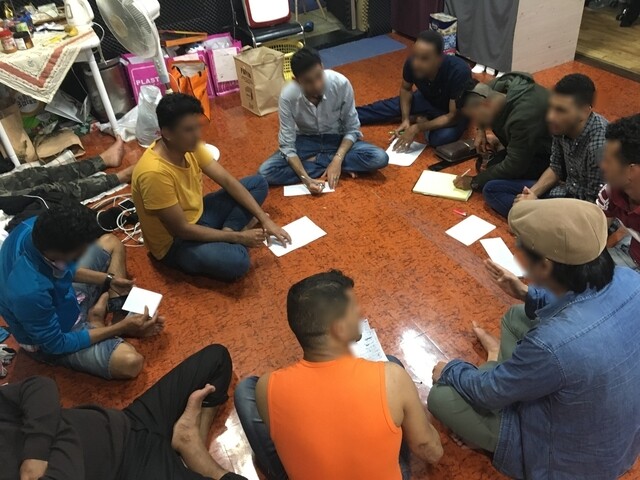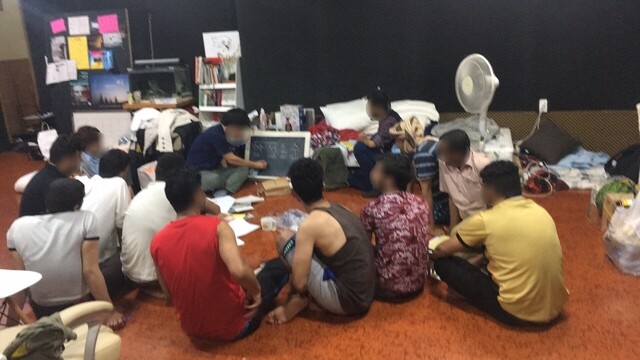hankyoreh
Links to other country sites 다른 나라 사이트 링크
[Reportage] Reaching out to Yemen’s dejected and stateless

The more than 500 Yemenis who came to Jeju Island, fleeing civil war at home, pose a serious question to South Korean society, as well as a difficult challenge that remains to be solved. As the Yemeni asylum seekers began to settle down, social media is rife with calls for their deportation, along with extreme expressions of hatred. At the same time, there are people who are planting the seeds of coexistence by calmly embracing the Yemenis, offering them shelter and bridging the cultural divide. They are quietly questioning the grounds for the hatred that has festered in anonymous online forums.
Ha Jeong-yeon (38, not her real name), who majored in gugak (Korean traditional music), has put up stranded Yemenis in her studio, located near the immigration office in Jeju City. When the Hankyoreh visited the 200 square-meter studio on June 19, about a dozen Yemenis were chatting together in a group, lying down on blankets on the floor. Ha’s janggu (drums) were lined up along one wall, while boxes of bread, milk, toilet paper and other supplies were stacked up in the room. None of this was subsidized by the central or local government – this comfortable shelter was created by Ha and her friends.
Ha’s inspiration for letting the Yemenis stay in her studio was simple: “I happened to read an article on Facebook saying that the Yemenis on Jeju Island didn’t have a place to sleep. I didn’t even know where Yemen is, but hearing that they didn’t have anywhere to go, it occurred to me that my studio was unoccupied.”

”I just wanted to keep them out of the rain”
It just so happened that there was heavy rain on the day Ha read that article on Facebook. “I figured the rain would make things even harder for the Yemenis. I got in touch with someone who helps refugees, said my studio wasn’t being used and asked if that might come in handy,” she said. Upon hearing that anything with a roof would be fine, Ha admitted ten or so Yemenis into her studio that very day. She created a temporary shelter, only bringing some blankets that had been at her house. “At first, I just wanted to keep them out of the rain,” she said with a smile.
Ha has been receiving help through her personal network. “I asked my friends for help, since there were Yemeni refugees in my studio but they didn’t have enough blankets, food or daily necessities. A lot of my friends are artists, and they’re definitely vulnerable to the emotional approach,” Ha said, chuckling.
Ha said that more than ten of her friends and members of a Catholic church that helps refugees come over every day to bring food and other necessities. In the evening, she and her friends have a Korean language class for the Yemenis. On June 14, a friend who works as a hair stylist came over, shortly before a job fair that the Jeju immigration office had set up. The stylist gave the Yemeni asylum seekers haircuts, since a respectable look might help out at the job fair.
Even while I was conducting interviews at Ha’s studio, two of her friends stopped by the studio with 10kg of jasmine rice and coffee and bread labeled as halal that they had picked up at a store specializing in foreign products at Dongmun Market in Jeju. They were trying to be sensitive to the religious practices of the Yemenis, many of whom are Muslim, and to their culinary preferences – they’re not used to the sticky japonica rice prevalent in Korean cooking.
Jeong Su-yeon (38, not her real name), who interviewed the elderly women of Jeju Island while studying cultural anthropology, is one of Ha’s friends who visits the studio every day. Since Jeong is familiar with Muslim culture thanks to her research about Indonesia during her college days, she serves as a cultural liaison, teaching Ha about how Islam works and the Yemenis about how things are done in Korea: “I teach the Yemenis about Korean culture. Even though saying ‘you’re pretty’ may sound like a compliment, for example, I explain how that can be a faux pas.”

What the elderly women of Jeju would have done
When Jeong is interacting with the Yemenis, she thinks of the elderly women of Jeju. “I try to think how those elderly women would have treated the Yemenis. They told me that even during the dark days at the end of the Japanese occupation, they would slip some boiled potatoes to young hungry Japanese soldiers. They were trying to treat people as people. The awful things they experienced during the Apr. 3 Incident aren’t much different from the situation of these refugees, who have been forced to leave their homes because of their civil war,” Jeong said.
These people who are sharing their daily lives with the asylum seekers from Yemen find it hard to understand the hate that is being unleashed against the Yemenis. “Islamic culture regards it as shameful to reveal human desires. It’s a culture in which it’s even considered shameful to ask for help when you feel hungry. This is a situation where such people have put aside their pride and are saying they desperately need our help right now,” Jeong said earnestly.
Ha feels the same way: “The Yemenis that I’ve seen up close are really respectful. When we’re having a meal, they won’t even pick up their utensils until I’ve started eating.”
About ten people have already left the studio to get a job. Ha remembers that, when she was saying goodbye to one Yemeni before he went to board a ship, he was shaking as he thanked her. Ha guesses that he was probably afraid of leaving behind the human kindness – the one thing he could rely on in the foreign land of South Korea – and setting out once again for somewhere new. “I told them that I respect their courage; that a better day would come; and that I would be praying for them. I guess that’s about all I can do,” she said.
For now, Ha plans to let the Yemenis keep using the studio. “I’m letting them borrow the space because it wasn’t being used – it’s not like any of this was planned.” Ha insists that she isn’t doing anything special, but she did want to say one thing: “These people may have come here by chance, but while they’re on Jeju, I think we ought to learn from them just as much as they learn from us. I wish the press wouldn’t just treat the Yemeni refugees as subjects of pity or hatred.”
By Lim Jae-woo, Hankyoreh 21 staff reporter
Please direct comments or questions to [english@hani.co.kr]

Editorial・opinion
![[Editorial] Intensifying US-China rivalry means Seoul must address uncertainty with Beijing sooner than later [Editorial] Intensifying US-China rivalry means Seoul must address uncertainty with Beijing sooner than later](https://flexible.img.hani.co.kr/flexible/normal/500/300/imgdb/original/2024/0517/8117159322045222.jpg) [Editorial] Intensifying US-China rivalry means Seoul must address uncertainty with Beijing sooner than later
[Editorial] Intensifying US-China rivalry means Seoul must address uncertainty with Beijing sooner than later![[Column] When ‘fairness’ means hate and violence [Column] When ‘fairness’ means hate and violence](https://flexible.img.hani.co.kr/flexible/normal/500/300/imgdb/original/2024/0516/7417158465908824.jpg) [Column] When ‘fairness’ means hate and violence
[Column] When ‘fairness’ means hate and violence- [Editorial] Yoon must stop abusing authority to shield himself from investigation
- [Column] US troop withdrawal from Korea could be the Acheson Line all over
- [Column] How to win back readers who’ve turned to YouTube for news
- [Column] Welcome to the president’s pity party
- [Editorial] Korea must respond firmly to Japan’s attempt to usurp Line
- [Editorial] Transfers of prosecutors investigating Korea’s first lady send chilling message
- [Column] Will Seoul’s ties with Moscow really recover on their own?
- [Column] Samsung’s ‘lost decade’ and Lee Jae-yong’s mismatched chopsticks
Most viewed articles
- 1Celine Song says she’s gratified global audiences have responded to the kismet of ‘inyeon’
- 2[Editorial] Transfers of prosecutors investigating Korea’s first lady send chilling message
- 3[Exclusive] Unearthed memo suggests Gwangju Uprising missing may have been cremated
- 4[Column] US troop withdrawal from Korea could be the Acheson Line all over
- 5For new generation of Chinese artists, discontent is disobedience
- 6Xi, Putin ‘oppose acts of military intimidation’ against N. Korea by US in joint statement
- 7Highly educated high-earners at risk of being replaced by AI, BOK study says
- 8Could Korea’s Naver lose control of Line to Japan?
- 9[Editorial] Intensifying US-China rivalry means Seoul must address uncertainty with Beijing sooner t
- 10Japan begins dumping irradiated Fukushima water amid outpouring of concern about vague timeline